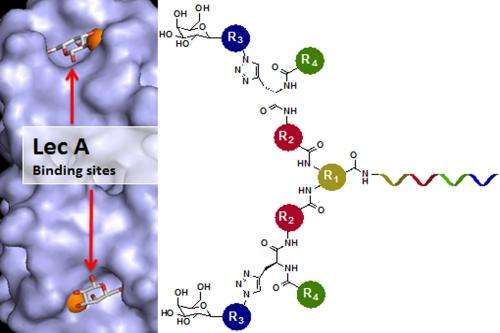Researchers find agent against hospital germ pseudomonas aeruginosa

No admission for bacteria: Scientists from the University of Freiburg have succeeded in preventing Pseudomonas bacteria from entering host cells with the help of a sugar complex. Dr. Thorsten Eierhoff and junior professor Dr. Winfried Römer from the Institute of Biologie II, both members of the Cluster of Excellence BIOSS Centre for Biological Signalling Studies of the University of Freiburg, have identified a sugar complex that binds the bacterial protein LecA in close cooperation with research groups led by Prof. Dr. Nicolas Winssinger from the University of Geneva, Switzerland, and Dr. Anne Imberty from the University of Grenoble, France. This protein enables the bacterium Pseudomonas aeruginosa to invade human lung cells. The researchers published their findings in the journal Angewandte Chemie.
Among other things, the hospital germ Pseudomonas aeruginosa can cause inflammation of the skin and lungs in patients with a weak immune system or a chronic illness. Moreover, these bacteria are often resistant to antibiotics. In tests conducted in cell culture, the researchers demonstrated that the germs penetrate into human lung cells 90 percent less often when treated with the agent.
The bacterial protein LecA binds the sugar galactose, which is exposed by receptors at the host cell surface. Via LecA, the bacterium attaches itself to the host cell and forces its way in. This allows the bacterium to spread through the body. The researchers developed a molecule that prevents LecA from docking onto the host cell receptors by binding to the bacterial protein with great precision. The research group led by Imberty succeeded in illustrating how the interaction between the sugar and the LecA protein looks like at the molecular level. "The agent is tailored precisely to bind to LecA: A framework of organic molecules places two galactose sugars at the right distance from one another for them to fit snugly into two of LecA's binding sites on the bacterial cell," explains Eierhoff. The agent resembles a plug made of galactose sugars that fits perfectly into the socket of LecA. Once bound to LecA, the agent works like a protective cap, preventing the Pseudomonas bacteria from invading the host cell.
The precisely fitting molecular framework was found by the research group led by the chemist Winssinger. The team arranged molecules that were potential candidates for binding partners on a chip. This allowed the scientists to test many samples at once. They determined which plug fit best with the protein LecA. The group led by Römer then tested the best-fitting molecule in cell culture to measure how many bacteria still managed to invade cells under the influence of the plug.
Binding to host cells via LecA is a significant path of invasion for Pseudomonas aeruginosa in human lung cells. The bacterium is responsible for roughly 80 percent of pneumonia-induced deaths in patients with cystic fibrosis, a genetic disorder of the mucous membranes. The researchers hope their findings will lead to the development of a novel agent capable of substantially weakening the germ.
More information: Dr. Alexandre Novoa, Dr. Thorsten Eierhoff, Dr. Jérémie Topin, Dr. Annabelle Varrot, Dr. Sofia Barluenga, Dr. Anne Imberty, Prof. Winfried Römer and Prof. Nicolas Winssinger. "A LecA Ligand Identified from a Galactoside-Conjugate Array Inhibits Host Cell Invasion by Pseudomonas aeruginosa." (2014) Angewandte Chemie: DOI: 10.1002/ange.201402831
Journal information: Angewandte Chemie
Provided by Albert Ludwigs University of Freiburg




















